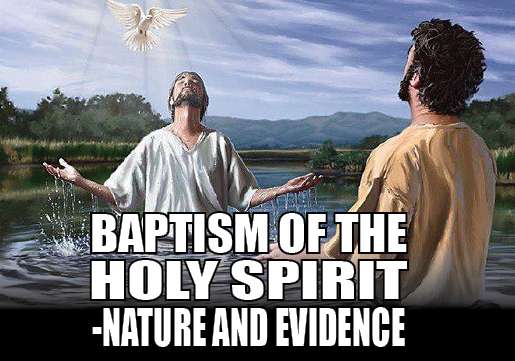
Baptism of the Holy Spirit-Nature and Evidence
Dr. Saji Kumar K. P.
INTRODUCTION
We live in a society where people are curious to know more about the experience of the infilling of the Holy Spirit. Even among the new generation Pentecostals this is a perplexing question. Many are looking for answers to questions such as: What is the nature of the baptism of the Holy Spirit?
What are the evidences of the baptism of the Holy Spirit? our aim is to understand the nature and evidence of the baptism of the Holy Spirit in its Biblical background. In order to reinstate our position, we need to establish certain stand points: The baptism of the Holy Spirit is a separate experience from the experience of salvation; speaking in tongues is essentially connected to the baptism of the Holy Spirit in the New Testament.
Baptism of the Holy Spirit is given to any believer who desires it, regardless of one's position in the church or society.
THE NATURE OF THE BAPTISM OF THE HOLY SPIRIT
1. Experience of the baptism of the Holy Spirit is central to the New Testament Church
The role of the Holy Spirit is central in the ministry of Jesus as well as in the ministry of the Apostles. The New Testament church has been baptized in the Spirit as Paul mentions in I Corinthians 12:13. The very word ‘Baptism’ of the Holy Spirit reiterates the fact of being immersed in the Holy Spirit or in other words being fully submerged into the control of the Holy Spirit. The great event of the Baptism of the Holy Spirit as experienced on the day of Pentecost was the fulfillment of Old Testament prophesies such as Ezekiel 36:27 and Joel 2:28. It is evidently central to the life of a believer because the experience on the baptism of the Holy Spirit is theologically and experientially distinguishable from and subsequent to the experience of repentance and salvation. This is understood when we read the need of the apostles to lay their hands on the already saved believers in Samaria as it is written in Acts of the Apostles 8:15. Paul believed that the disciples of John the Baptist needed to receive the Baptism of the Holy Spirit after their water baptism for this same reason. (Acts of the Apostles 19: 5-6). Hence the experience of the Baptism of the Holy Spirit is very central to the New Testament Church.
2. Baptism of the Holy Spirit is available to all believers
When the prophet Joel predicted the outpouring of the Holy Spirit, he said that the Lord will pour out His Spirit upon every one regardless of age, gender, caste and creed. Likewise Jesus said the heavenly father will give the Holy Spirit to whoever asks Him (Luke 11:13). The promise is for all the believers and the experiences of the early church underlines the same aspect. The Holy Spirit baptism is available to all. While John the Baptist made the promise of Messiah concerning the Baptism of the Holy Spirit, he said the same perspective. The promise is: “He will baptize you with the Holy Spirit and fire” (Mathew 3:11). People from all walks of life were present to hear his message. Jesus made no demarcations and no classifications while the promise of the counselor was given (John 14:16-17; 15:26; 16:7-). Peter the Apostle said on the day of Pentecost that the Baptism of the Holy Spirit is available for all. His words were: “The promise is for you and your children; and for all who are far off, for all whom the Lord our God will call” (Acts 2:39).
3. The Holy Spirit is given only to those who have been conscious of their sins and have repented
The Baptism of the Holy Spirit is obtainable to only those who have repented of their sins. Peter in Acts of the Apostles 2:38 says that the gift of the Holy Spirit is given to those who repent and have been baptized. Jesus saw the descending of the Holy Spirit like a dove and lighting on him right after he came out of the water after baptism (Mathew 3: 16). The Apostles did a great ministry after being empowered by the Holy Spirit after the day of Pentecost experience. The baptism of the Holy Spirit therefore was given to the disciples after they were waiting for it. The purpose was to empower them for the mission ahead. John 16: 13 says, “But when he, the Spirit of truth, comes, he will guide you into all the truth. He will not speak of his own; he will speak only what he hears, and he will tell you what is yet to come”. This verse is fulfilled as part of the baptism of the Holy Spirit only when it is understood as the continuous preparation of a believer towards holiness and subsequently to the ultimate redemption at the coming of the Lord. Ezekiel 36: 25 and 26 say: “I will sprinkle clean water on you and you will be clean; I will cleanse you from all impurities and from all your idols. I will give you a new heart and put a new spirit in you; I will remove from you your heart of stone and give you a heart of flesh”. This is a prophecy from Ezekiel concerning the days to come when the children of God will be able to walk in truth by the help of the new spirit in which they will be baptized. The baptism of the Holy Spirit is given to the new believers so that they will walk cleansed. This altered life is made possible by the indwelling of the Holy Spirit as described in Titus 3:5 (b): “ He saved us through the washing of rebirth and renewal by the Holy Spirit”.
THE EVIDENCE OF THE BAPTISM OF THE HOLY SPIRIT
1. Speaking in tongues as the initial empirical evidence
Acts of the Apostles 2:4 says “All of them were filled with the Holy Spirit and began to speak in tongues as the Spirit enabled them”. This experience of the Baptism of the Holy Spirit with the evidence of speaking in tongues is connected to the promise of God in the Old Testament as Peter later explains it. The Baptism of the Holy Spirit is connected to speaking in tongues as explained in the initial outpouring of the
Holy Spirit on the day of Pentecost. Chapter 10 of the Book of the Acts has another incident of the Baptism of the Holy Spirit to those who heard the word of God in the gathering at Cornelius’s house. They were all in repentance as they listened to the word of God and that was more than enough for the Holy Spirit to baptize them with His presence and the evidence was that they all spoke in tongues. There was no other means to recognize the baptism of the Holy Spirit than the evidence of speaking in tongues.
2. The inner confidence as evidence of the baptism of the Holy Spirit
While a believer is baptized in the Holy Spirit, he/she is gaining a confidence of the seal of God which is the assurance of the guarantee of the inheritance in Christ. “And you were also included in Christ when you heard the word of truth, the gospel of your salvation. Having believed, you were marked in Him with a seal, the promised Holy Spirit. Who is a deposit guaranteeing our inheritance until the redemption of those who are God's possession – to the praise of His glory” (Ephesians 1:13-14). Paul says in 2 Corinthians 5: 5 that: “Now it is God who has made us for this very purpose and has given us the Spirit as a deposit, guaranteeing what is to come.” The believer who is baptized in the Holy Spirit is continuously reminded by the Holy Spirit that this person belongs to God. Therefore, one of the evidences of the Baptism of the Holy Spirit is this inner confidence and conviction.
3. The evidence of practical life
The one who is baptized in the Holy Spirit knows that the very experience is something transforming to him/her. This is an ongoing inner transformation and assurance. Romans 8: 9 says: “You however are controlled not by the sinful nature but by the Spirit, if the Spirit of God lives in you. And if anyone does not have the Spirit of Christ, he does not belong to Christ”. If anyone claims to have been baptized in the Holy Spirit and does not live in obedience to the commandments of the Lord, he/she is fooling himself/herself. Faith and obedience to Christ is the greatest evidence of the baptism of the Holy Spirit. It was declared by Christ that He will send the Holy Spirit as counselor to help disciples to be reminded of the sin, justice and judgment. “When he comes he will convict the world of guilt in regard to sin and righteousness and judgment: In regard to sin, because men do not believe in me; in regard to righteousness, because I am going to the father, where you can see me no longer; and in regard to judgment, because the prince of this world now stands condemned” (John 16: 10-11).
4. Other evidences
In the promise of the Holy Spirit as described in Acts of the Apostles 1:8 it reads: “But you will receive power when the Holy Spirit comes on you; and you will be my witnesses in Jerusalem, and in all Judea and Samaria, and to the ends of the earth”. The Holy Spirit was given to people so that they will be empowered to preach the gospel. It happens because, baptism of the Holy Spirit makes the experiencing of the resurrected Christ so real to people that they go out of their comfort zone and take the gospel to the unreached people. The evidence of the Baptism of the Holy Spirit therefore is the empowerment and stirring up for evangelism.
There is another evidence of the baptism of the Holy Spirit through the exercising of gifts and fruits of the Holy Spirit. The fruit of the Holy Spirit is explained in nine attributes of a person or community as seen in Galatians 5: 22-23. They are love, joy, peace, patience, kindness, goodness, faithfulness, gentleness and self control and gifts of the Holy Spirit in 1 Corinthians 12:1-11 are revelation, knowledge, discernment of the spirits, wisdom, prophecy, and interpretation of tongues, tongues, faith, miracles and healing.
Conclusion
The baptism of the Holy Spirit opens up a believer to the full range of Christian life. It is something that every believer must earnestly seek for. The exercising of the practical evidences of the Holy Spirit is very essential today because the world is moving ahead with sin and evil. We need to give emphasis to the baptism of the Holy Spirit as a subsequent experience after salvation because it is rooted in the Bible. The edification of the believers and the upkeep of their practical life are central to the works of the Holy Spirit and that is what we must prioritize in our understanding. There must be systematic teaching given to the new generation concerning the Baptism of the Holy Spirit. The generation must understand well that the practical implication of the baptism of the Holy Spirit is pleasing and rejoicing not only to us but also to the Lord almighty.







